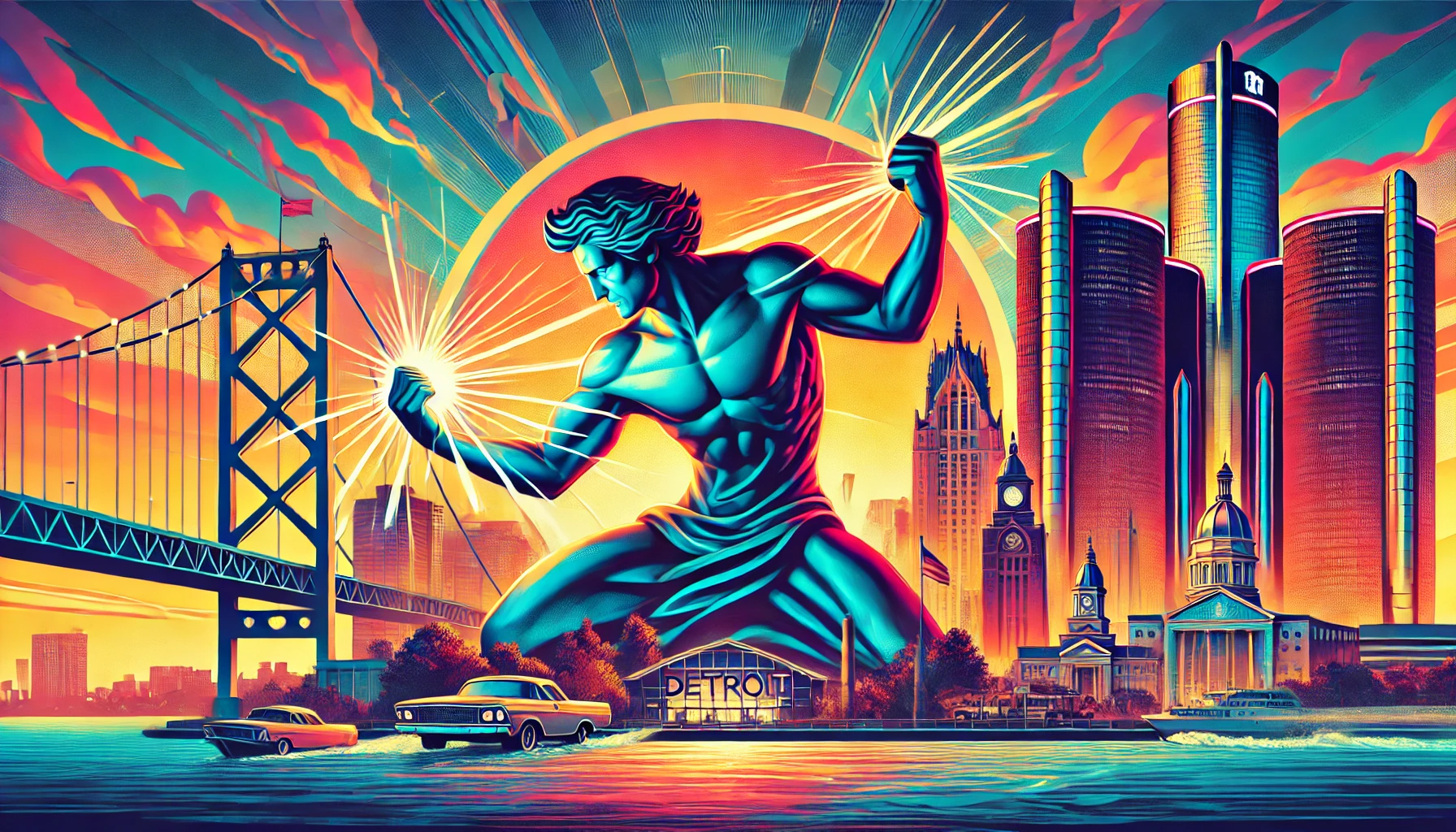During a rally in Detroit, Donald Trump warned an audience that if his opponent is elected: “The whole country will be like — you want to know the truth? It’ll be like Detroit,” intending it as an insult.
This remark encapsulates a widespread misunderstanding of the city’s history and resilience. Detroit’s journey from industrial powerhouse to economic decline and back to reinvention mirrors the challenges the United States faces today. Far from being a cautionary tale, Detroit is a testament to the grit, ingenuity, and innovation that define the American spirit.
Today, Trump’s Agenda 47 and Project 2025 initiatives promise to dismantle social safety nets, roll back labor protections, and focus on deregulation—a direction that risks exacerbating inequality and economic instability. In stark contrast, Detroit’s story of rise, fall, and resurgence offers a blueprint for the nation to embrace policies that prioritize innovation, labor rights, and inclusive growth.
Making America look like Detroit means reigniting the principles of resilience, community strength, and collective progress that once made the Motor City the envy of the world. Detroit’s historical narrative offers a compelling blueprint for national rejuvenation. Once the epicenter of American industry and innovation, Detroit’s journey of rise, decline, and resurgence embodies the resilience and ingenuity that can guide the nation toward a more equitable and prosperous future.
It’s time to “Make America Detroit Again.”
Recipe for Disaster
For decades, Republican administrations have championed the mantra of fiscal conservatism and small government. But history tells a different story: a persistent “rinse and repeat” cycle of economic mismanagement, soaring deficits, and ballooning national debt. Democratic administrations, by contrast, have consistently stepped in to clean up the mess, restoring stability and setting the country back on a sustainable path.
The pattern is undeniable. Bush Sr.’s continuation of Reaganomics hollowed out the middle class, leaving the nation in a recession with soaring deficits by 1992. Bill Clinton reversed this with fiscally responsible policies, balancing the budget and creating a surplus. George W. Bush inherited this prosperity but left office after an eight-year economic collapse—job losses, a housing crisis, a stock market crash, two unfunded wars, and a $1.4 trillion deficit. Obama stabilized the economy, slashed unemployment, and reduced the deficit, handing Trump a strong foundation. Yet Trump exploded the deficit with a $1.7 trillion tax cut for the wealthy, mismanaged key industries, and added $8 trillion to the national debt.
This recurring cycle undercuts Republican claims of fiscal responsibility and highlights the need for an alternative approach—one rooted in resilience and community-building, as exemplified by Detroit’s resurgence.
In the wake of the 2024 election, President-elect Donald Trump seems to have adopted a “Hold my beer” attitude, intent on doing more damage than his first term or any of his predecessors. He has unveiled a series of initiatives under the banners of Project 2025 and Agenda 47, signaling a shift toward policies that emphasize deregulation, reduced federal oversight, and a rollback of social programs. Notable among these are proposals to dismantle the Department of Education, impose high tariffs on imports, and implement stringent immigration controls. Additionally, recent cabinet appointments, such as nominating Matt Gaetz for Attorney General and Tulsi Gabbard for Director of National Intelligence, have sparked controversy and concern regarding the direction of the incoming administration.
Detroit’s Rise: A Symbol of the American Dream
In the early 20th century, Detroit emerged as the heart of the automotive industry, earning the moniker “Motor City.” Henry Ford’s introduction of the $5-a-day wage in 1914 not only revolutionized manufacturing but also set a new standard for worker compensation, attracting a diverse workforce and fostering the growth of a robust middle class.
However, it’s important to acknowledge that Ford was not a good human being and certainly not without significant controversy. He was a rabid antisemite whose writings in The Dearborn Independent spread hateful conspiracy theories, and he openly supported and enabled Nazi Germany through his company’s dealings. These reprehensible beliefs and actions tarnish his legacy, but the industrial advancements he spearheaded in Detroit—particularly the moving assembly line and fairer wages—undeniably transformed the city and contributed to the creation of a thriving middle class.
The establishment of the United Auto Workers (UAW) in 1935 further solidified labor rights, leading to improved wages, benefits, and working conditions, building on Ford’s industrial innovations while striving for a more equitable and inclusive labor movement.
This era of prosperity extended beyond the assembly lines. Detroit became a cultural hub, giving birth to the Motown sound that resonated across the globe. The city’s neighborhoods thrived, characterized by homeownership, quality public education, and vibrant community life. Detroit’s success story was a testament to the power of industrial innovation coupled with strong labor movements, illustrating that equitable wages and worker protections are foundational to building a thriving middle class.
The Fall: Deindustrialization and Economic Decline
The latter half of the 20th century brought significant challenges to Detroit. Globalization, automation, and competition from foreign automakers led to factory closures and mass layoffs. The erosion of union jobs undermined the economic stability of the middle class, leading to urban decay, population decline, and social unrest. The 1967 Detroit riot, a five-day period of civil disturbance, highlighted the racial and economic tensions exacerbated by these economic hardships.
These challenges were not unique to Detroit; they mirrored broader national trends of industrial decline and the weakening of labor unions. The city’s struggles underscored the consequences of neglecting manufacturing sectors and the importance of adapting to changing economic landscapes while safeguarding workers’ rights.
The Resurgence: Lessons in Reinvention
Despite these hardships, Detroit has embarked on a path of reinvention. Public-private partnerships have played a pivotal role in revitalizing the city’s infrastructure and economy. A notable example is the restoration of the Michigan Central Station, transforming it into a hub for innovation and technology.
Grassroots initiatives have also been instrumental. Community organizations have worked tirelessly to rebuild neighborhoods, support small businesses, and promote cultural growth. The city’s burgeoning tech scene and emphasis on entrepreneurship have attracted a new generation of innovators, positioning Detroit as a leader in sectors like green energy and information technology.
National Implications: Making America Detroit Again
Detroit’s narrative offers valuable lessons for national policy. Investing in infrastructure and manufacturing can stimulate economic growth and job creation. Empowering labor movements ensures fair wages and job security, fostering a stable middle class. Community-driven revitalization efforts highlight the importance of inclusive growth that benefits all citizens.
In contrast, policies that prioritize deregulation and reduced federal oversight, as proposed in Project 2025 and Agenda 47, risk repeating the mistakes of the past by neglecting the needs of workers and communities. Embracing Detroit’s spirit of resilience and innovation can guide the nation toward a future where economic prosperity is shared, and the American Dream is attainable for all.
Reclaiming the American Dream
Detroit’s story is a powerful reminder that resilience, innovation, and collective action can overcome even the most daunting challenges. By learning from Detroit’s experiences, the nation can build a stronger, fairer, and more resilient future. It’s time to make America Detroit again, embracing the grit and ingenuity that define the American spirit.


